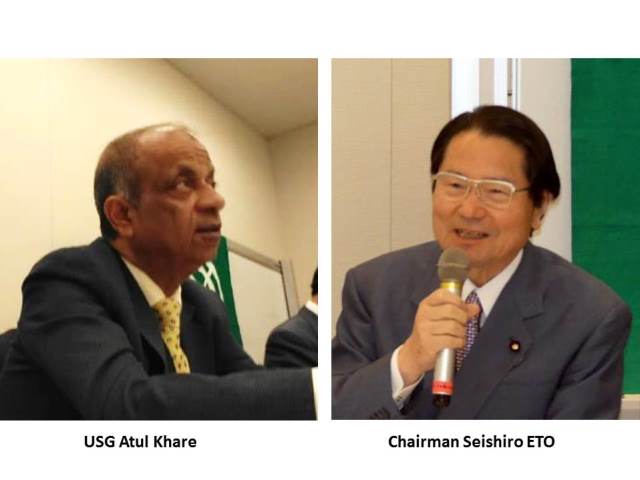
At a meeting held on 16 October and chaired by Mr. Seishiro ETO and attended by several members of the Diet, United Nations Under-Secretary-General for Operational Support Atul Khare noted Japan can provide valuable support to UN peace operations through UN triangular partnership capacity building project. Stressing the importance of medical services in peace operation environments, he declared that the UN provides all available medical services to treat wounded people and save their lives regardless of their affiliations. Some Diet members encouraged the UN to pursue innovative approach to extend medical care to peacekeepers including through telemedicine. The Diet members included Shintaro ITO, Tadahiko ITO, Kiyoshi ODAWARA, Masahiko SHIBAYAMA, Mio SUGITA, Asahiko MIHARA, and Shunsuke MUTAI, Masaharu NAKAGAWA of the Liberal Democratic Party, Tomoko ABE, Hiroyuki MORIYAMA, and Yuriko YAMAKAWA of the Constitutional Democratic Party of Japan, Shinji OGUMA of the Democratic Party of Japan, and Hideki NIIZUMA of the KOMEITO.
Mr. Seishiro ETO, senior member of the House of Representatives and former Minister of State for Defense, opened the meeting as Chair of the Japanese Parliamentary Group for World Federation and welcomed USG Atul Khare. Mr. ETO then explained that the House of Representatives of the Diet of Japan passed a resolution in August 2005 and the House of Councillors passed yet another resolution in 2016 calling on the Government of Japan to pursue the path for realization of a World Federation in order to strengthen international organizations and rule of law, abolition of nuclear weapons with a view to enhance human security for attaining perpetual peace based on the principles set forth in the Constitution of Japan. He then expressed his hope that the meeting with Mr. Atul Khare will enhance the understanding of members of the Diet on UN operations aimed at sustaining peace.
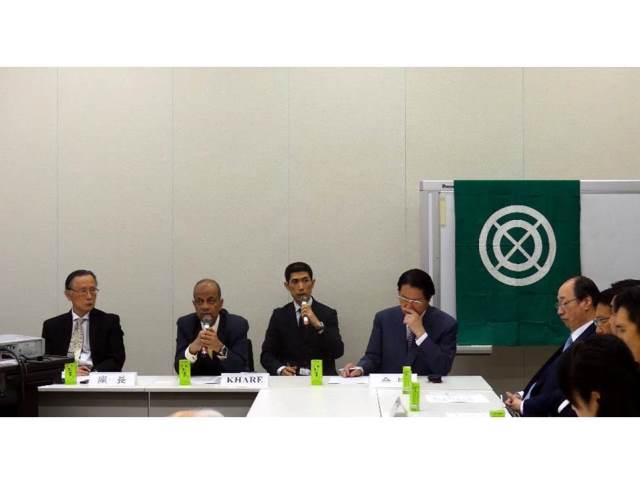
Mr. Atul Khare thanked Mr. Seishiro Eto for his introductory remarks and expressed his feeling of sadness to those who suffered so much from the typhoon that had just struct the eastern part of Japan. He found that the Japanese government and people had shown again their preparedness in coping with the damages caused by the natural disasters.
Mr. Khare shared Mr. Eto` hope that the meeting will pave a way for strengthening the cooperation between the UN and Japan. He was grateful to the Government of Japan for its strong support of the United Nations and its operational activities particularly UN peace operations. Japan has been providing manpower and material contributions to the UN peace operations for 37 years deploying total number of 13,000 self-defense personnel since 1992, most notably in Cambodia, Timor-Leste, Haiti and South Sudan. Japan had lost two dedicated people: UN Volunteer Atsuhito Nakata and Police Officer Haruyuki Takada in Cambodia. Mr. Khare mentioned also Mr. Takahisa Kawakami, who lost his life in Timor-Leste while he was serving as Deputy Special Representative.
Mr. Khare then pointed out the changing nature of threats to global peace and stability was had transformed the nature of UN peace missions from monitoring case-fires to acting as a transitional authority to institution building. UN peace operations were increasingly called upon to respond to conflicts that were intra-State in nature, rather than conflicts between States. Peacekeepers were deployed to environments where there is no peace to keep. Armed groups were routinely using terrorist tactics and targeting peacekeepers. Conflicts had become increasingly entangled with transnational organized crime and terrorism, making them unamenable to negotiated political solutions. In Mali and Somalia, civilians have become a target of armed attacks.
Mr. Khare then addressed some key issues that member Governments are providing policy directives on. He noted the importance of ensuring the safety and security as well as the performance of peacekeepers. It required improvements in physical facilities such as helicopters and armored vehicles. The UN is already using drones and other latest equipment. The safety of personnel also required better trained personnel in emergency health services and evacuation facilities. For this purpose, Mr. Khare said that Japan had been supporting peacekeeping training, including through funding the development of basic first aid training, the roll out of a regional protection of civilians training, and the hosting of women protection advisors training. The cooperation the UN has with Japan was a flagship model for partnerships between Member States, TCCs and the UN. Mr. Khare added that mostly recently he was negotiating with the Government of Japan to secure the services of super doctors who could provide services through telecommunication facilities.
In concluding his remarks, Mr. Khare said that peace must be attained through internal national political process. Peace could not be imposed from outside. For this reason, he made two points. First, the primacy of politics was an important concept which he hoped could be discussed with members of the Diet. Secondly, the important role that women could play in peace process, particularly negotiations. The third point was the importance of training in securing the accountability of peace operations. He concluded by expressing his appreciation of the presence of so many members of the Diet and for wearing SDG budges which signified the recognition of sustainable development as a key condition for attaining and sustaining peace.
(The full text of Mr. Atul Khare`s speech is shown at the end of this article. The text conveys his appreciation of the leadership role played by Japan in training of UN peace personnel since the 2014 Summit on United Nations Peacekeeping, when Prime Minister Abe announced Japan’s intention to contribute to the Triangular Partnership Project in support of rapid deployment of enabling capabilities to peacekeeping missions. The Project brings together the United Nations, supporting Member States with the expertise and resources, and troop-contributing countries to strengthen peacekeeping.)
Following Mr. Khare`s introductory speech, Mr. Hasegawa identified four key points made by Mr. Khare. They were: (1) valuable support Japan has been providing to UN peace operations; (2) triangular partnership Japan is engaged in UN peace operations with African and Asian countries in an effort to improve their performance; (3) valuable roles women can play in community negotiation process and extending health services for successful UN peace operations; and (4) need to secure the accountability of UN peace operations for which Japan was asked to play a key role in enhancing it. Mr. Hasegawa was then asked Mr. Masahiko Shibayama, former Minister of Education and Special Assistant to Prime Minister Shizo Abe on UN Peace Operations to comment on Mr. Khare`s presentation.
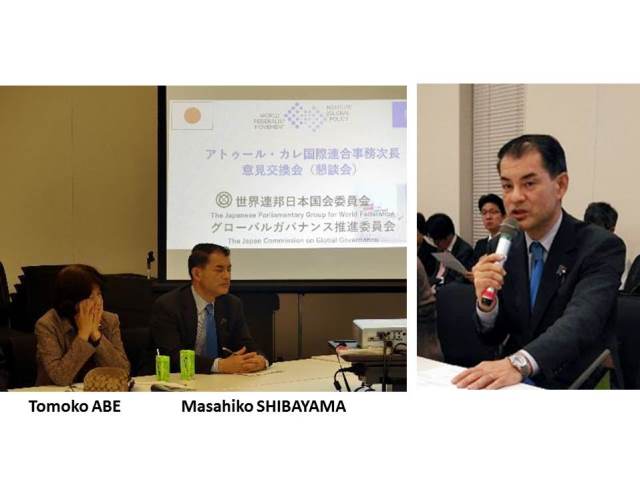
Mr. Masahiko SHIBAYAMA said that when, he was assistant to Prime Minister Shinzo Abe, he was engaged in operationalizing the policy of kaketsuke keigo and also negotiating with President Salva Kiir concerning the withdrawal of Japanese defense force engineers from South Sudan. He found it significant and difficult to have a clear understanding of the division of work among troop and police contribution countries, when the situation became volatile in South Sudan with the increasing hostile actions both the Government and the main opposition party lead by Mr. Riek Machar started to take. In addition to this observation of the situation in South Sudan, Mr. Shibayama said that he wanted to know from USG Khare what Japan could do to help improve the UN peace operations.
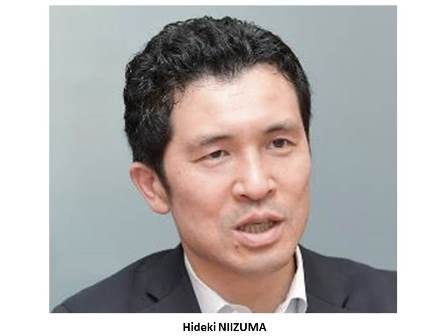
The second Diet member to speak was Mr. Hideki NIIZUMA of the KOMEITO who asked how the UN was trying to secure safety and health of UN personnel in dangerous and worsening security situation.
USG Atul Khare responded to Mr. Shibayama by informing that Japan was playing an active and important role in developing an operational manual and providing capacity building. More than 100 countries that were involved in UN peace operations knew and appreciated Japan`s triangular partnership contributions. Concerning the division of responsibility, each troop contribution country has a sector to look after but all troop contributing countries were expected to assist each other in time of crisis situation. In response to the second question, Mr. Khare agreed to make sure that the safety of personnel must be the highest priority concern of the UN and noted that the evacuation of its personnel might have to take place if and when security situation become precarious. But, he cautioned, that the UN cannot withdraw just because the situation reached at the critical level. He added that Japan have kept four security personnel in South Sudan, two of whom are women. Mr. Khare referred to a meeting he had with Mr. Yamaguchi, Leader of the Komeito party, and explained that first aid rescue team must arrive in site of emergency situation within 10 minutes followed by the evacuation of wounded within one hour, and the stabilization of their conditions within two hours. He added the importance of having helicopters with night-flight capacity for armed attacks take place often just before it gets dark.
Mr. Shintaro ITO, member of the Liberal Democratic Party, then asked about the deployment of UN peacekeepers in conflict areas where there is no clear indication of parties to conflict. He also wanted to know if there is any criteria or framework for extending medical service protection.
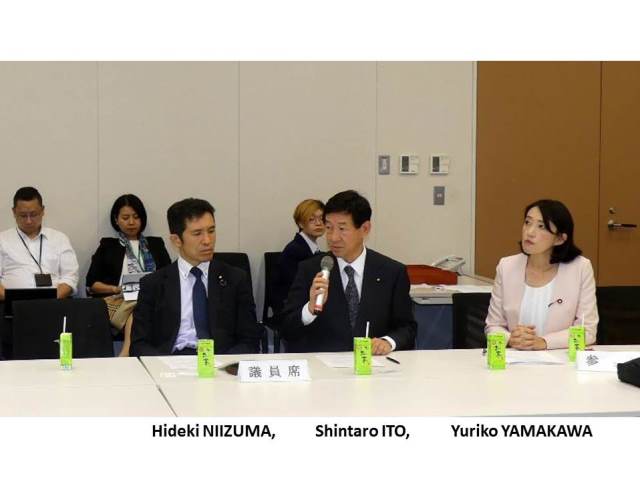
In response, Mr. Khare agreed that it was no longer possible to identify party to conflict in terms of traditional criteria such as government and opposing parties. Terrorist groups such as Al-Shabaab has been waging jihad in Somalia. The Government of Somalia and the African Union Mission to Somalia (AMISOM) have been engaged in combat against Al-Shabaab which has been designated as a terrorist organization by the United States and other western countries. Concerning the medical care of victims of armed conflict, the United Nations is developing a framework. But he stressed that the UN policy is based on the principle of humanitarianism and indicated as an example that he gave instructions to AMISOM staff in Somalia that all injured personnel of not only AMISOM and Somali Government but also Al-Shabaab be provided with medical care. In Mali, he instructed the UN mission to evacuate not only several UN personnel but all other victims numbering as many as 100 from mine explosions be evacuated. The UN policy reflects the principle of humanitarianism and human security as Japan advocates.
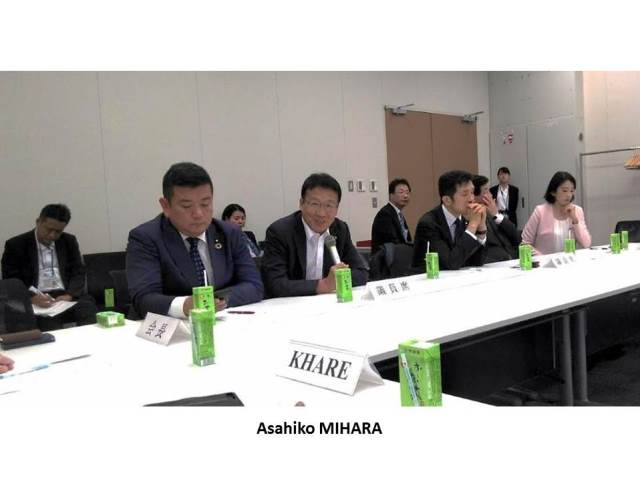
Mr. Asahiko MIHARA was pleased to learn that the international community recognized the contributions made by Japan to UN peace operations. He then referred to the five principles of Japan`s participation in UN peacekeeping activities that was enacted in 1992. Noting that the Japanese Self-Defense Forces (SDF) were not military forces and SDF personnel were not permitted to engage in combat operations outside of Japan, Mr. Mihara asked for Mr. Khare`s views.
Mr. Khare recognized that the Japanese government and people must adhere to the Constitution of Japan in engaging in UN peace operations. He then said that, while the Japanese Self-Defense Forces personnel could not be engaged in combat operations, they could still provide capacity building, in-kind contributions and medical support as he had already mentioned. Japanese police could also contribute to UN peace operations as four policemen from Japan had produced a curriculum which is still used. He stressed that Japanese government and civil society could contribute to UN peace operations within the framework of the Constitution.
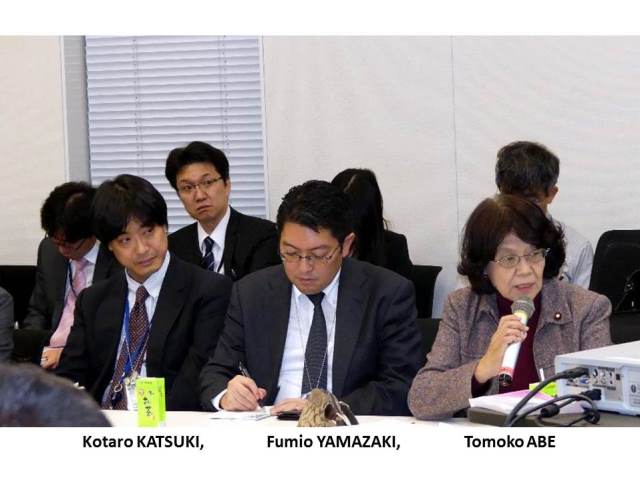
Ms. Tomoko ABE, member of the Constitutional Democratic Party of Japan and member of the House of Representatives, then asked about the role of the United Nations in natural disaster mitigation measures designed to prevent or reduce the risk to life, property, social and economic activities. She also wanted to know what the United Nations expected of Japan in mitigating natural disasters. USG Khare referred to the leadership role played by Japan in hosting the third UN World Conference on Disaster Risk Reduction in 2015 in the City of Sendai. He pointed out the difference in how Haiti and Bahama had difficulty addressing the outcome of natural disasters. Mr. Khare then mentioned that he had learned from Mr. Yamaguchi of the Komeito Party that he was proposing to institute a higher level of earthquake proof for buildings.
Mr. Khare then stressed that no peace and security could be kept if and when natural disasters occur as shown in Haiti when the cyclone hit. It was well recognized in the international community that the assistance provided by Japan Self-Defense Forces engineers was most helpful.
Following the completion of dialogue between members of the Diet and USG Atul Khare, experts on the UN matters were invited to make comments and ask for questions.
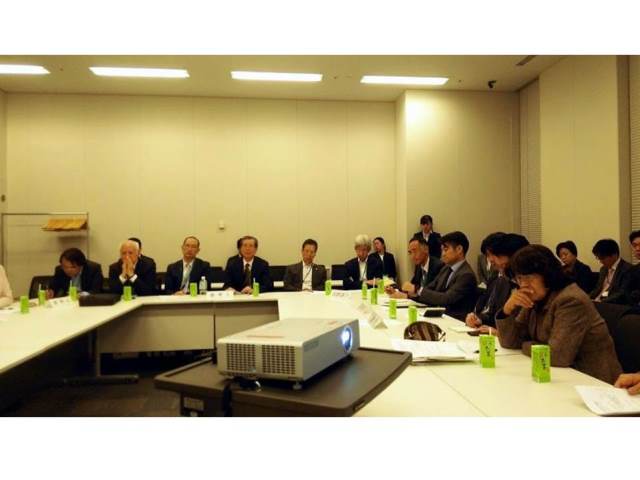
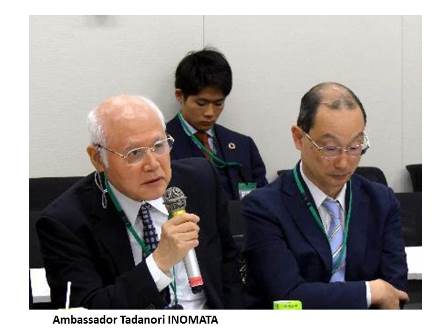
Ambassador Tadanori INOMATA spoke first and noted that Secretary-General António Guterres had been advocating a whole-pillar approach to the prevention of conflict by addressing root causes of disasters and conflicts. He then asked about any chance that existed for the Secretary-General to establish a strategic planning framework within the UN system to integrate three pillars of peace & security, human rights and sustainable development.
He noted that the General Assembly had already approved his vision to promote a system-wide strategic planning both at global and country levels in the context of the Quadrennial Comprehensive Policy Review of Operational Activities for Development of the UN system. However, there still existed a fundamental lacuna between the peace &security pillar and the SDG pillar despite agreement reached in the General Assembly and the Security Council to promote peace sustaining which encompasses the whole areas of security of persons in humanitarian assistance, peace building and peace keeping operations. The Secretary-General has envisaged to close this lacuna in the proposed triennial Plan Outline containing the long-term priorities and the objectives of the Organization which he presented in the context of the 2020 proposed program budget. Sensing from lack of recommendation in the June Committee for Program and Coordination, Mr. Inomata found the chance for the General Assembly to adopt a system-wide strategic planning framework to integrate the three pillars to promote peace sustaining and sustainable development, was very slim.
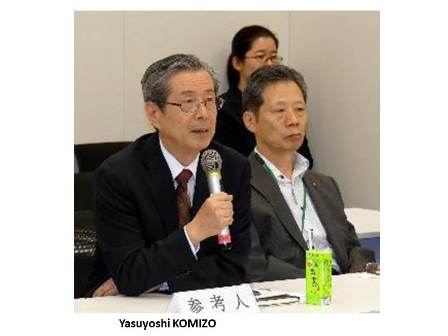
Ambassador Yasuyoshi KOMIZO expressed his gratefulness to USG Khare for very informative presentation on PKO activities and challenges. He was encouraged by USG Khare`a comments on the international community recognized highly Japan’s contribution to the UN peace keeping operations in particular in the field of emergency assistance, creation of manuals, facility constructions, capacity buildings and training.
He then asked for Mr. Khare`s views about the area of further contributions Japan could make in the wider area of UN peace operations and activities. The reason he asked the question was that the UN was increasingly engaged in wide aspects of peace creating activities beyond traditional PKO that included, among others, conflict prevention, peace recovery, reconstruction, facility building, election support, reconciliation. He wanted to know the areas where Japan could make differences and contribute to the international community in these areas beyond traditional PKO activities.
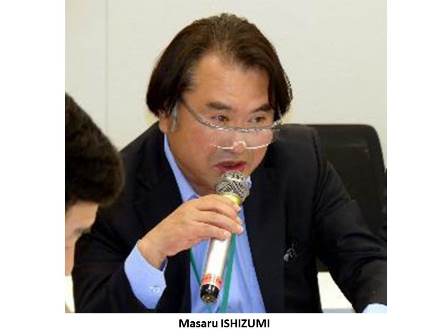
Professor Masaru ISHIZUMI of Kanagawa University referred to the background papers distributed among the participants. He found in the second page of our resume, two resolutions adopted in the National Parliament of Japan in 2005 and 2016. Both of them stipulate crystal clear Japanese firm commitment to the peace building process through the UN. They also declare national commitment to the further evolution of global political integration, i.e. ultimate creation of the World Government/Federation. Given the importance of these resolutions, he requested Japanese Parliamentarians to live with this commitment and expressed his hope that Japanese Parliamentarians present would make special effort in disseminating the strong commitment of Japan to the multilateralism at every opportunity. He also expressed his confidence that Under Secretary General Atul Khare who kindly delivered a very encouraging speech also support this valuable voice of Japan. He then reiterated strongly the importance of the fact that Japan which is still a major financial contributor to the UN continues to adhere firmly to the multilateralism and the UN idealism at the time of the rise of nationalism in many parts of the world.
USG Atul Khare said that he appreciated as valuable the comments and suggestions made by ambassadors and professors. He could not comment on every issue raised but noted prevention that Secretary-General Antonio Guterres advocates require the combined efforts in the areas of peace and development particularly SDGs. He recognized the need for strengthening rule of law and governance to combat corruption through the reformed United Nations system. In conclusion, he hoped that Japan would strengthen its contributions through triangular partnership.
In concluding the dialogue meeting, Mr. Hasegawa identified the importance of central message of USG Khare`s presentation. As the nature of conflict and threats to peace change, Japan should make new contribution by increasing triangular partnership to help African countries to strengthen their capacity to deal with conflict themselves.
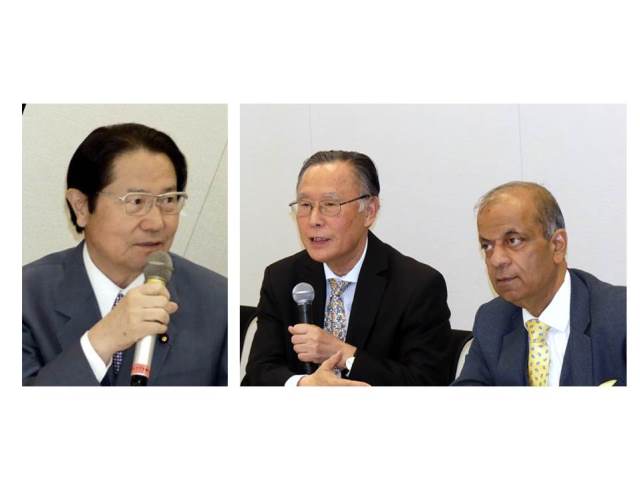
Mr. Eto then expressed his appreciation of the useful exchange of information and views some members of the Diet had with Mr. Atul Khare. Referring to nationalist-oriented leadership prevalent in the contemporary world, Mr. Eto pointed out the need for new leadership. USG Khare responded and suggested Japan exercise “servant leadership” in which the main goal is to serve the international community as a whole and ultimately creates a more just and caring world.
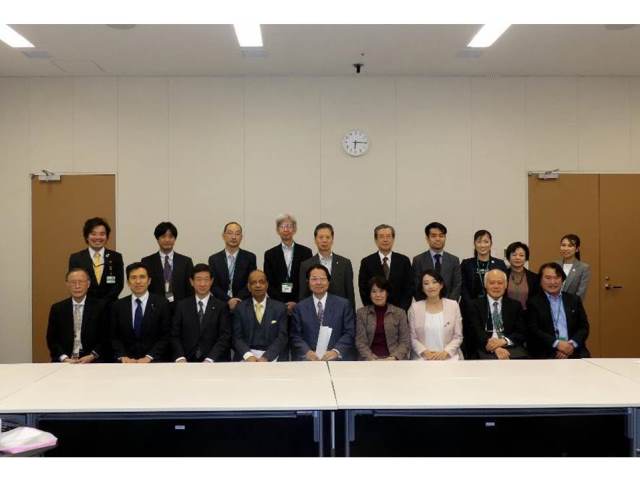
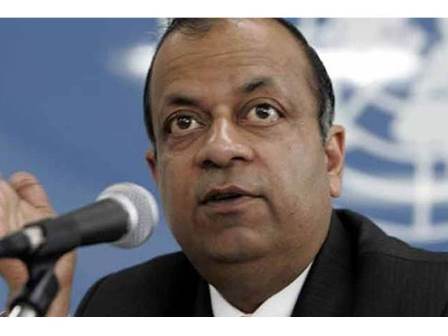
Excellencies, Ladies and Gentlemen,
I would like to express my thanks to members of the House of Representatives and the Global Governance Committee for inviting me to be here.
The topic of today’s discussion How can Japan contribute to UN peace operations? Is an important one, and I look forward to our discussion. But, before I go into the theme of today’s meeting, let me say a few words on Typhoon Hagibis. We are all deeply saddened by reports of loss of life and extensive destruction caused by this major typhoon. I would like to convey the Secretary-General’s and my own deep condolences to the families of the victims, the Government and people of Japan. We would also like to acknowledge the extensive and efficient preparation the authorities and the people of Japan made for this extreme weather event and wish a speedy recovery to those who are injured.
Excellencies, Ladies and Gentlemen,
Japan has a long history of active engagement in and commitment to United Nations peacekeeping. Japan is the third largest financial contributor to United Nations peacekeeping budget and to the UN regular budget which includes our budget for our special political missions. Many Japanese personnel including civilian, troops and police have served in our missions. Japan is thus a critical partner in UN peace operations.
Current context of UN peace operations and challenges. Today, United Nations peace operations is a partnership of over 130 countries contributing over a hundred thirty thousand troops, police and civilian personnel for the maintenance of global peace and security. Over the past seven decades United Nations peacekeeping has had a positive record of preventing conflict, supporting political processes and sustaining peace in various corners of the globe. Cote d’Ivoire and Liberia are recent testaments to this. But, looking further back and in the Asia-Pacific region, we had successes in countries such as Cambodia and Timor-Leste. I would like to take a moment to acknowledge the achievements and sacrifices of Japanese civilian and uniformed peacekeepers. In Cambodia, many Japanese peacekeepers worked under the overall leadership of Mr. Yasushi Akashi, Chief of Mission of the United Nations Transitional Authority in Cambodia (UNTAC) which oversaw elections and helped restore peace. I consider Mr. Akashi, my “sensei” on UN peacekeeping. We must also not forget that two Japanese peacekeepers lost their lives in the pursuit of peace in Cambodia, Mr. Haruyuki Takata from the Japanese Police and Mr. Atsuhiro Nakata, elections UN Volunteer.
In Timor-Leste, I had the fortune of working closely with many talented Japanese peacekeepers. From Japanese Ground Self Defense Forces engineers who built roads and bridges that the Timorese people still call “Japanese roads” and “Japanese bridges,” police officers who wrote text books for the national police and to many Japanese civilian officers who supported the Timorese people and supported me in diverse areas from political affairs, democratic governance, development, humanitarian to administration. Mr. Sukehiro Hasegawa, who headed the UN Office in Timor-Leste (UNOTIL) is another senior UN peacekeeper from whom I have learned a lot from. In Timor, we lost Mr. Takahisa Kawakami, Deputy Special Representative for the Rule of Law from natural causes. He died keeping and building peace. In many ways, he was a true peacekeeper.
Excellencies, Ladies and Gentlemen,
The nature of threats to global peace and stability has significantly evolved since the early days of UN peacekeeping and since the days in which UN missions were monitoring case-fires or were serving as a transitional authority or focusing on institution building. UN peace operations are increasingly called upon to respond to situations within, not between States. Peacekeeping operations are increasingly deployed to environments where there is no peace process in place. Armed groups are routinely using terrorist tactics and targeting peacekeepers. Conflicts are increasingly entangled with transnational organized crime and terrorism, making them unamenable to negotiated political solutions.
Excellencies, Ladies and Gentlemen,
Recognizing that addressing these challenges would require the support of all peacekeeping partners, the Secretary-General launched the Action for Peacekeeping (A4P) initiative in March 2018. He called on the Security Council, troop-and-police contributors, host governments, regional organizations and other peacekeeping partners to do three things: (1) refocus peacekeeping with realistic expectations; (2) make peacekeeping missions stronger and safer; (3) mobilize greater support for political solutions and for well-structured, well-equipped and well-trained forces. 152 Member States and four international organizations heeded the call of the Secretary-General and endorsed the A4P Declaration. The Declaration categorizes UN peacekeeping work into eight main thematic areas: politics; Women, Peace and Security (WPS); protection; safety and security; performance and accountability; partnerships; sustaining peace and conduct. In November 2018, the Secretary-General affirmed A4P as the core agenda for all peacekeeping-related work. In response, the Secretariat identified established priorities for implementation and developed concrete, actionable and measurable targets with fixed timelines.
Excellencies, Ladies and Gentlemen,
Strengthening the performance of UN peacekeeping operations is at the heart of Action for Peacekeeping. Central to this effort was the Secretary-General’s reform of the UN development, peace and security and management systems. Linking the three streams together was a crucial step in enhancing the mandate implementation and functioning of the organization while strengthening accountability. As part of these reforms, on 1 January 2019 the Secretary-General established a new Department of Operational Support and the Department of Management Strategy, Policy and Compliance. The underlying idea was to separate policy from operational support while ensuring the allocation of sufficient capacity to oversee and continuously improve internal administrative policy and compliance. The Department of Operational Support delivers on effective mandate implementation and support while providing guidance and advisory services to clients across the Secretariat, and in exceptional cases, exercises delegated authorities on behalf of its clients when they lack these capacities. The Department of Operational Support partners with client entities to mutually define requirements and co-create solutions in the areas of supply chain, uniformed personnel support, human resources, capacity development, medical and transactional services. Like other entities of the Secretariat, the Department of Operational Support, has made A4P the agenda of its peacekeeping related work.
Excellencies, Ladies and Gentlemen,
Training constitutes a vital aspect of improving the safety and security as well as the performance of our peacekeepers. I would like to convey my special gratitude to the Government of Japan for supporting peacekeeping training, including through funding the development of Basic First Aid Training, the roll out of a regional Protection of Civilians training, and the hosting of Women Protection Advisors training. The partnership with Japan is a flagship model for partnerships between Member States, TCCs and the UN. Japan has also been a very important training partner for us since the 2014 Summit on United Nations Peacekeeping, when Prime Minister Abe announced Japan’s intention to contribute to the Triangular Partnership Project in support of rapid deployment of enabling capabilities to peacekeeping missions. The Project brings together the United Nations, supporting Member States with the expertise and resources, and troop-contributing countries to strengthen peacekeeping. Since its inception, the Government of Japan has contributed a total of US$83 million to the Project. Highly skilled Japanese Self Defense Force personnel have also trained military personnel from Kenya, Uganda, Tanzania and Rwanda in the operation and maintenance of heavy engineering equipment. This training was crucial to addressing critical shortfall of engineering capacities in our missions. I would like to express gratitude to the Government of Japan for this support. Under the Triangular Partnership Project, DOS with the support of Japan and other partner Member States has facilitated and conducted training of 365 uniformed engineers and over 3500 uniformed signals personnel. Many of the trainees have already deployed to missions all over Africa. We have expanded the project to include engineering training for Asia and the surrounding region last year by launching the training in Vietnam last year and we have just launched the field medic assistant course in Uganda. The beauty of the Triangular Partnership Project is that it has no limitation in terms of possible areas for training. As the challenges and needs of our peace operations change, the Triangular Partnership Project can also evolve to offer the training to address those challenges. We hope that Japan will continue to be a champion of the UN Triangular Partnership Project as it further expands and evolves and continue to strengthen our peacekeepers.
Excellencies, Ladies and Gentlemen,
To improve the safety, security and health of our peacekeepers, the Department of Operational Support is also improving the effectiveness of the medical rescue chain in our peacekeeping missions. To do this, we have been rolling out basic and advanced first aid training to troop contributing countries, as well as implementing quality standards for the delivery of healthcare services. We are developing a curriculum for combat medics, with courses planned for the second half of this year. We are also continuing our efforts to improve the conditions of our Level I and II hospitals in our high-risk missions (MONUSCO, MINUSCA, MINUSMA, UNMISS and UNAMID) to ensure that no life is sacrificed due to lack of adequate medical care. We are also looking to implement telemedicine technologies to improve the quality of care provided at mission level. We want to create a robust technology-powered remote healthcare network to support frontline UN field operations including a capability to access an international network of healthcare specialists and facilities in countries with high level of medical expertise. Providing the best healthcare possible to those who risk their safety in the implementation of UN mandates is at the top of the Department of Operational Support priorities. I believe that highly skilled and technologically advanced doctors of Japan can providing medical care to our peacekeepers without leaving their offices in Tokyo, Osaka or wherever their offices may be.
Excellencies, Ladies and Gentlemen,
The Department of Operational Support has been integrating a gender and geographic distribution perspective in its operational activities in line with the Secretary-General’s vision for gender parity and geographic distribution. DOS is managing the Senior Women Talent Pipeline (SWTP) which aims to improve the gender balance in senior level positions by creating more robust female candidate pools. As of now, 23 out of 250 women in the SWTP have been selected for senior field positions. While the current pipeline has an impressive breadth of talent, additional interested applicants are being sought to meet the growing demand for applicants. DOS also continues to administer the Young Professionals Programme to improve the gender and geographic diversity of our workplace by appointing highly qualified young professionals from unrepresented and underrepresented countries to regular P-2 posts of the Organization. I encourage Japan to nominate more women for SWTP and encourage young Japanese women and men to join the United Nations through the Young Professionals Programme. While we have had wonderful SRSGs like Mr. Akashi and Mr. Hasegawa and Mr. Yamamoto is managing an extremely challenging mission in Afghanistan, I hope to see many more Japanese take up leadership positions in our peace operations.
Excellencies, Ladies and Gentlemen,
When we talk of contributions to UN peace operations, we often focus our attention on troops, police and money. I am well aware that due to increasing security risks in many of our operations and your Constitutional restrictions, it may be difficult for Japan to send an infantry battalion to missions in countries like Mali or the Central African Republic. Of course, we will welcome highly skilled Japanese troops, especially engineering units. But Japan can contribute in many other innovative ways. By training peacekeepers through the Triangular Partnership Project, providing medical care to frontline peacekeepers remotely through Telemedicine and by encouraging more Japanese young people to join the United Nations and follow in the footsteps of Mr. Akashi, Madam Ogata, Mr. Hasegawa and Mr. Yamamoto.
Thank you.
